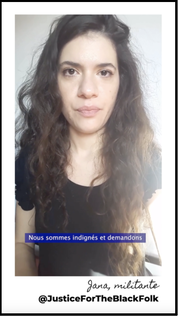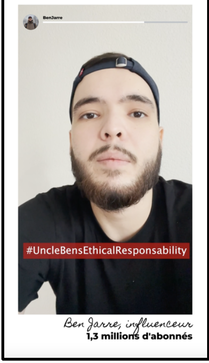Uncle Ben's becomes Ben's original
|
Video 1. The campaign in 3 languages
Creation of the artwork
The students sought to produce a design largely inspired by the Bauhaus style. After a lot of research, they noticed that the Bauhaus style is characterised by its clean, minimalist style, geometric lines and simple forms. In addition, they noticed that three colours came up regularly: blue, yellow and red. They also chose to reproduce the brand's logo so that it would fit in perfectly with the style of our design. Fig. 1. Bauhaus design of the Uncle Ben's logo
To give an interactive dimension to their work, the students filmed themselves as anti-racism activists adopting three persona in an international setting: as a German activist, as a young French housewife and as a British influencer. The three testimonies protest against a brand that recalls America's segregationist past and that symbolised how systemic racism is embedded in our society and that it is high time to end it. By using three different nationalities, the students emphasised the global dimension of the Black Lives Matter movement but also the general outrage against the brand. They also subtitled the videos for a better understanding of foreign languages.
Their testimonies are in line with the strong commitment of the younger generation who came out in large numbers to march against racism in the summer of 2020. Video 2 explaining the making of the artwork
|
Big Corporate Brands under fire for complicity in peddling racist stereotypes
This exhibit is built around the campaign and pressure brought to bear on corporate brands whose past and present are linked to the colonial and the slavery era. In this artwork, the students showcased how international pressure and boycott campaign by activists and influencers forced Uncle Ben's to change its name and logo in the aftermath of the protests that followed George Floyd's killing and that forced big corporations that had been complicit in peddling racist stereotypes to take corrective action. For instance, Quaker Oats has a wide range of breakfast products for breakfast: pancake flour, syrups pancake flour, syrups, pancake mix, etc. Since its creation 131 years ago, in 1889, the symbol of the brand was the face of a black woman, who we assume, at the time, worked for a white family, thus recalling slavery and segregation. This image, which perpetuates racist stereotypes is no longer acceptable today. Under pressure from the public and the Black Lives Matter movement, Quaker Oats assured that Aunt Jemima would be taken off the shelves, and that they would redesign the packaging and name of its brand name. Soon, other brands followed suit. Uncle Ben's was founded in 1943 and became the best-selling rice brand in the US in the 1990s. Embodied by an African-American, the name of the brand had a strong racist connotations, since older slaves were, as the only mark of respect, called "uncle" or "aunt" but not by their names. The students observed that we are now in an era where consumers no longer buy just a product. With the wide variety of brands on the market, if customers have a choice between similar products, they will choose the brand that most closely matches their values and beliefs. Indeed, according to the 2018 Edelman Earned Brand study, approximately 64% of consumers prefer to buy from brands based on their values. (+13 points compared to 2017). These big corporate brands are in direct contact with their customers and are therefore exposed to direct and massive feedback. Positive comments will enhance their sales and thus improve the company's image.
In the same way, negative reviews can be detrimental or even fatal. So, driven by consumer feedback, brands are forced therefore take a stand on societal issues such as diversity, gender, sexual orientation, feminism, the environment, respect for animal welfare and racism. They are called more and more to be transparent, responsive, open to change and ethically responsible.Thus, the students wished to show, through their work, how Uncle Ben's taking into account the feedback from society, led the brand to review its identity and reinvent itself to better meet the aspirations of consumers. Thus, feedback here being negative, had a regulating effect on the brand. The importance of feedback in the society The project showcased Wiener's cybernetics theory in that it showed that learning and permanent adaptation are what allow us to evolve and survive in an ever changing environment. In a consumer society like ours, feedback is of paramount importance. In order for companies to continue to meet the needs of consumers, they must constantly adjust their products and services by observing and subsequently adjusting their offering. This cyclical process ensures that companies keep their offer in line with society's expectations. The socio-cultural values of society are changing and it is therefore important that companies remain vigilant and learn from their environment and past experiences to provide the most appropriate offer. With the rise of Black Lives Matter demands in the US in the spring of 2020, the movement spread around the world, including to France where it was driven by Adama Traoré's case (a Malian-French man who died in custody after being restrained by racist French police.) Uncle Ben's brand was accused of racism because of its name and logo. The latter depicted a black elderly man and was therefore reminiscent of the United States' slave-owning past and the rice plantations exploited by black slaves. Following the social protests, Fiona Dawson, a senior manager at Mars (the company to which Uncle Ben's belongs) said: "We have listened to thousands of consumers, our own employees and other stakeholders around the world over the past few weeks" and "we are committed to ensuring that our products are free of racism" and added "We understand the inequities associated with the name and face of the brand. with the name and face of the previous brand." So, in September 2020, Uncle Ben's announced a change to its logo and name to Ben's Original. Its new packaging will arrive on our shelves from 2021. |




